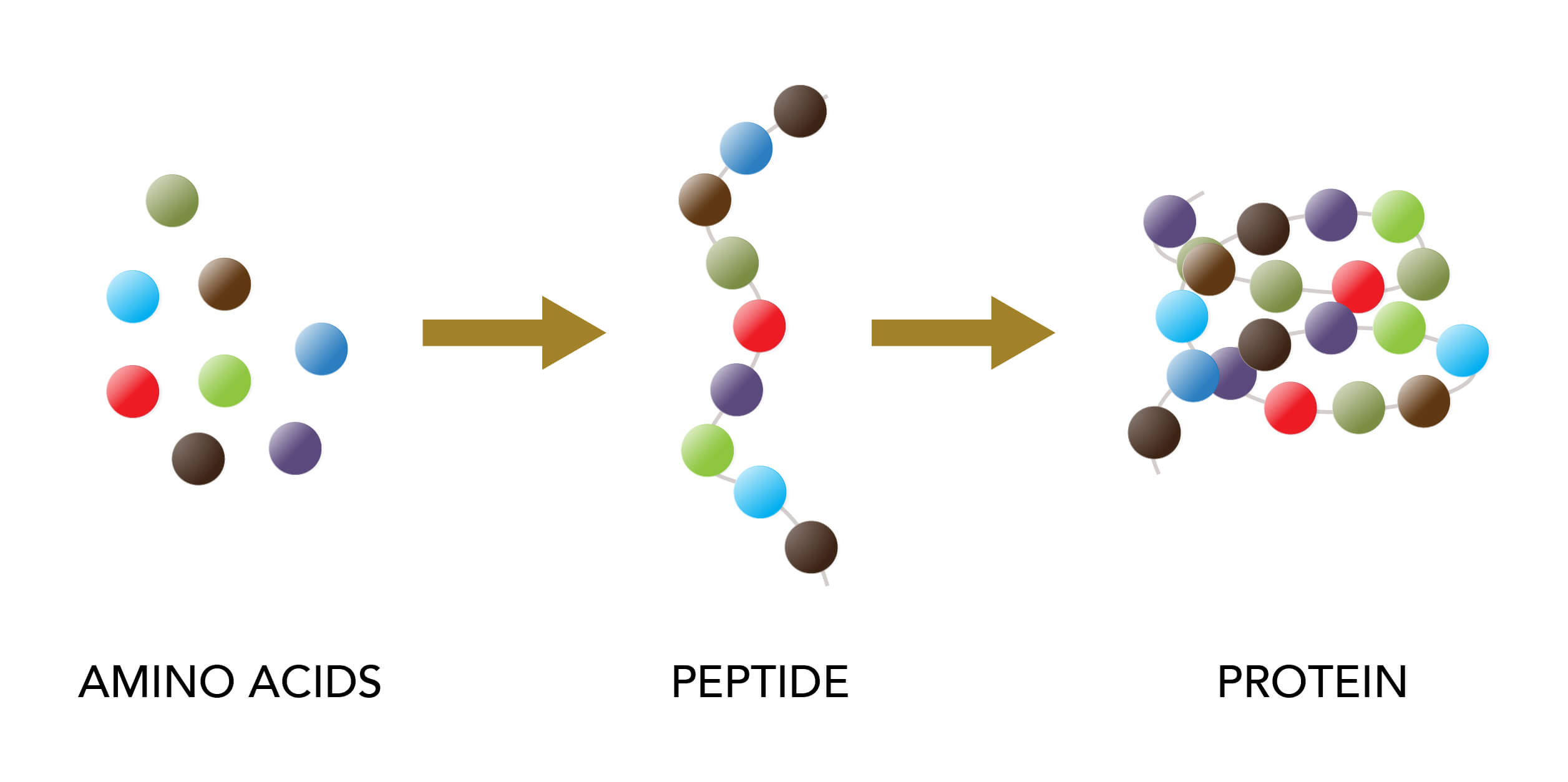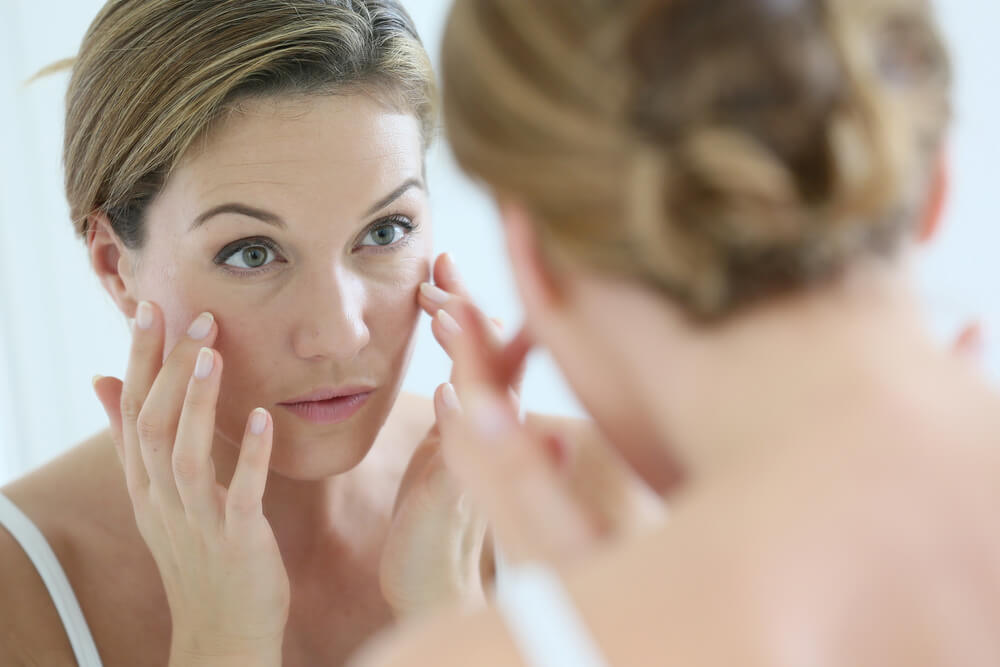Peptides – What You Need to Know

If you have ever spent time looking into anti-aging skin care ingredients, then you have probably already come across peptides.
Peptides first entered the skin care world in the 80’s. However, thanks to the developments in peptide technology since then, this ingredient is now considered to be a skin care must-have.
Why?
Here is everything you need to know…
What Are Peptides?

Peptides may seem a little confusing, especially because there are several types out there, but they are actually pretty simple.
Peptides are short chains of amino acids – basically, small fragments of proteins. When peptides are combined in specific ways, they create different proteins.
As you probably already know, proteins make up the main building blocks of your skin. Two of the main proteins in your skin are collagen and elastin, both of which are also made up of amino acid chains, and, therefore, peptides.
Around 80% of your skin is made up of just collagen, which is why the skin takes on a more wrinkled and sagging appearance when collagen production begins to decline with age. Other factors, from the processed foods that you eat to sun exposure and pollution, can also impact the collagen in your skin, making peptides more necessary than ever.
Peptides in Skin Care
Your skin already contains peptides, and these are peptides that have been naturally produced by your body.
However, when it comes to the peptides in skin care products, these have been produced synthetically.
You are probably thinking…
Surely synthetic peptides aren’t as good as natural peptides?
This isn’t necessarily true…
Scientists have a huge amount of control over the peptides that they produce in a lab. Synthetic peptides are highly stable and effective, and this is something that would have been hard to accomplish with natural peptides.
What Do Peptides Actually Do?
When peptides were first used in skin care in the 1980’s, their main purpose was to accelerate wound healing.
However, peptides have come a long way since then…
Today, they are able to do everything from improving hydration to increasing skin firmness and elasticity, making them such a versatile ingredient.
Of course, their specific function depends on which peptide you use…
The Different Types of Peptides
There are four main types of peptides used in skin care, and each one has its own unique effects.
The name of each individual peptide will give you an idea as to how many amino acids it consists of. For example, if a peptide is made up of two amino acids, it is referred to as a di-peptide, whereas those made up of three amino acids are known as tri-peptides.
Why does this matter?
Because the size or weight of your peptides will have an effect on how deeply they can penetrate into the skin. Usually, peptides that are composed of less than ten amino acids will be small and light enough to enter into the skin’s layers, whereas anything larger than this will usually only work on the skin’s surface.
Carrier Peptides
The main role of carrier peptides is to deliver trace elements, such as copper and magnesium, deep into the skin.
Copper peptides are a great example of this, with this peptide being one that is already found naturally in the body. Copper peptides provide the skin with copper, and this has a few different effects:
- Promotes collagen and elastin production
- Encourages the skin to naturally remove any damaged collagen and elastin
- Increases production of the carbohydrates in the body that maintain and support collagen and elastin
This means that copper peptides can have quite a significant anti-aging effect. They not only encourage skin firmness, smoothness and tightness, but they also help to maintain these results in the long term.
Enzyme Inhibitor Peptides
As you can tell from their name, enzyme inhibitor peptides work by blocking the activity of certain enzymes in the body.
Why would you want these enzymes to be blocked?
Because certain enzymes actually cause far more harm than good…
The enzymes targeted by enzyme inhibitor peptides are known as matrix metalloproteinases, or MMPs. When this group of enzymes gets too active, they end up breaking down the collagen in your skin.
What happens then?
This basically speeds up the rate at which your skin ages, including fine lines, wrinkles and loose skin.
Enzyme inhibitor peptides, such as Trifluoroacetyl tripeptide-2, Soybean peptides and Trylagen, stop the MMPs from damaging your collagen. This then prevents premature skin aging, keeping your skin looking and feeling younger for longer.
Neurotransmitter Inhibitor Peptides
Neurotransmitter inhibitor peptides are becoming increasingly popular.
Why?
Because they offer up a similar effect to Botox, but without the needles.

How do neurotransmitter inhibitor peptides actually work?
They basically prevent your muscles from contracting. When applied to the face, this then prevents expression lines from forming, whether this may be in the forehead, around the eyes, around the mouth or anywhere else.
This allows the skin to relax, diminishing the look of existing expression lines while preventing new ones from forming.
Sounds good, right?
One thing to keep in mind is…
The lines on your face are caused by several different factors. While facial movements do contribute to this quite a bit, so does everything from the sun’s UV rays to pollution. Neurotransmitter inhibitor peptides will only have a noticeable effect on expression lines, and won’t make any sort of difference to lines that have been caused by environmental factors.
Some of the neurotransmitter inhibitor peptides commonly used in skin care products include:
- Palmitoyl Tripeptide-38
- Palmitoyl Tripeptide-28
- Argireline
- XEP-30
Wondering what the palmitoyl means in the first two peptides listed above?
It means that the peptide has been attached to Palmitic acid. This makes the peptide more oil-soluble, making it better able to penetrate through your skin’s lipid layers.
Signal Peptides
As you can guess from their name, the main role of signal peptides is to send signals to different cells in your skin.
What sort of signals do they send?
They usually tell the skin to increase its production of different proteins, including collagen and elastin. This function makes signal peptides another great anti-aging ingredient, since they can really help to counter the age-related decline in collagen and elastin.
While copper peptides, which were mentioned earlier under carrier peptides, could also be considered a signal peptide, other common signal peptides include:
- Palmitoyl Pentapeptide-4
- Palmitoyl Oligopeptide-7
- Matrixyl-3000
Which Peptide Type is Best?
Just about all of the peptide types will be able to increase your skin’s production of collagen and elastin, while protecting your skin’s proteins.
So, how do you know which one is best?
This all depends on your skin’s individual needs…
If you are looking to directly target the expression lines on your face, then neurotransmitter inhibitor peptides are ideal. On the other hand, if you know that your lifestyle choices have caused the proteins in your skin to break down at a faster-than-average rate, go for enzyme inhibitor peptides.
If you’re looking for a general anti-aging peptide, signal peptides, including copper peptides, are all you really need. They also tend to be the most affordable out of the bunch, and have quite a bit of research backing up their effects.
Choosing Peptide Skin Care Products

Convinced that your skin would benefit from the use of peptides?
That’s not surprising, since peptides would be beneficial to pretty much everyone.
However, don’t go reaching for the very first peptide-infused skin care product you come across, as they are not all created equally…
Ever since peptides have become so popular, skin care companies are now including them in just about every product imaginable.
What’s wrong with this?
Well, certain products, such as cleansers, don’t actually remain on the skin for very long before they are washed away. It is pretty pointless spending extra money on a peptide-infused cleanser, because the peptides won’t really have the opportunity to penetrate into your skin before you rinse them off.
So, which skin care products are best if you want to get the most out of peptides?
Ideally, anything that will remain on your skin for an extended amount of time, such as:
- A serum
- A moisturizer
- An eye cream
Out of those three, a lightweight serum would probably bring you the best results. An example would be the 24K Collagen Renewal Serum and the 24K Anti-Aging Eye Serum, which are both enriched with multiple peptides.
Why?
Because although serums also moisturize the skin, they don’t contain the heavy ingredients that a moisturizer does. This means that they are able to penetrate deeper into the skin than a moisturizer, which is exactly what you want when using peptides. By sending the peptides directly to the skin cells that need them, you will notice their results so much faster.
Whichever type of product you decide to go for, make sure that you always check the ingredients list.
Wondering what you should be looking out for?
Well, to begin with, take a look at exactly which peptides have been used in the product. Their placement on the ingredients list will also give you an idea of the concentration of peptides used in that product. If peptides are listed near the top of the ingredients list, this is great. On the other hand, if they’re way down at the bottom, then chances are that the product you’re looking at doesn’t contain enough peptides for them to actually make a significant difference to your skin.
Finally, you should also take a look at the other ingredients used in the product you are considering.
Which other ingredients work well with peptides?
Vitamins and antioxidants are ideal accompaniments. These will also help to increase your skin’s natural production of collagen and elastin, while protecting and preserving the proteins that are already in your skin.
One more thing that you should be aware of…
Peptides are quite vulnerable ingredients, meaning that it doesn’t take long for them to oxidize and degrade. This isn’t something you want, especially when you have invested a fair bit of money into your new peptide-infused skin care routine.
How can you avoid this?
By going for products that have been packaged with a pump-style dispenser, rather than a jar with a lid. This limits the amount of air that is able to enter into the product, therefore minimizing oxidation.
Containers that are dark-colored, or, even better, opaque, are also more beneficial. This stops light from coming into contact with the ingredients within, therefore prolonging their shelf life even more.
Natural Food Sources of Peptides
In addition to applying peptides to your skin, you could also try seeking out more natural food sources of peptides. This will help to nourish your skin from within, giving you even greater results in the long run.
Wondering which foods contain peptides?
Here are some of the best:
- Milk – while milk may be one of the richest natural sources of peptides out there, it can also lead to inflammation in the skin. It can also trigger flare-ups of certain skin conditions, including acne and rosacea. If you want to consume more milk for its peptides, go for a variety that is grass-fed and organic, as this will help to cut down on the side effects that milk can have
- Eggs – the peptides that you will find in eggs are powerful anti-inflammatory agents, and are also good sources of antioxidants
- Soybeans – soybean peptides have potent antioxidant properties, and are also able to increase Type I collagen in the body
- Marine fish – contains high amounts of essential peptides, as well as proteins and fatty acids
It always helps to enhance the effects of topical ingredients by consuming their whole food sources.
The world of peptides can definitely seem confusing. However, the main thing that you need to know is that peptides can really have a huge impact on how your skin ages. From minimizing the appearance of fine lines and wrinkles to giving your skin a youthful smoothness and tightness, it is really no surprise that peptides have become the latest must-have ingredient in skin care.

